Edinburgh printable map of top tourist attractions & city travel guide
Edinburgh city centre free travel guide - Top 10 must-see sights & best destinations - Edinburgh top tourist attractions map
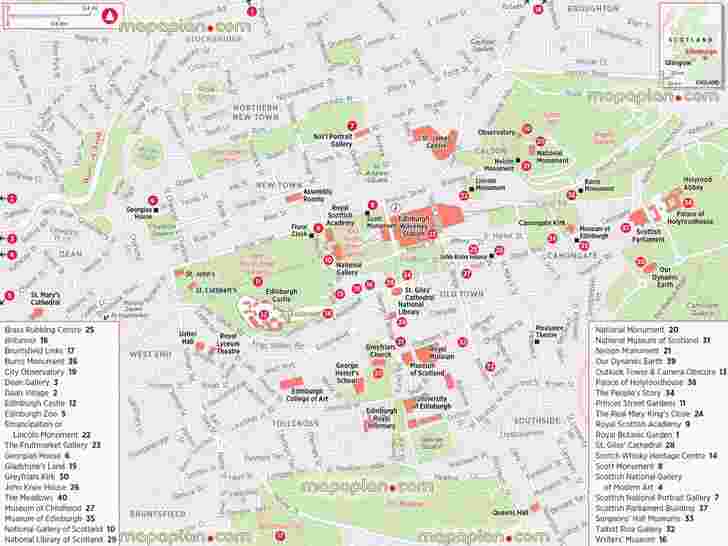
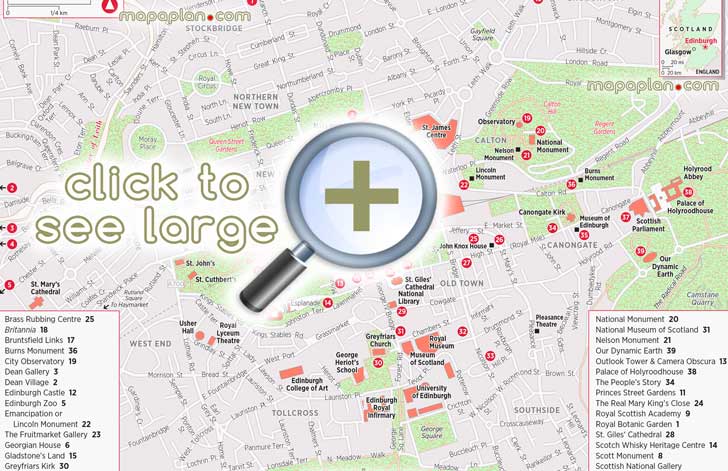
Maps of best attractions in Edinburgh, Scotland
Edinburgh maps will guide you to the best destinations in the city. Because of its narrow streets, you can only explore the Old Town by walking. The city doesn't have a metro / subway system, but most of the major attractions are located along the Royal Mile, Princes Street, or one of the major streets of New Town. It’s very easy to find your way around Edinburgh. The city is centered on its old street, the Royal Mile, which runs downhill between Old and New Town from Edinburgh Castle in the west to the Palace of Holyroodhouse in the east. Edinburgh's top sights, plus hotels, shopping centres, and many of the city’s key landmarks are plotted on our detailed city plans. Public transportation points are also marked, and indicated by the symbols listed in the maps key. Armed with these maps, you should be able to find the accurate location of must-see places. Mapping out a trip to explore Edinburgh can be far from the usual. This page includes a range of maps and plans which will help you make the most of your visit to Edinburgh. If you are either a first-time tourist looking for the top 10 must-do sights or if you are returning to Edinburgh to discover something new - all you need to ensure an enjoyable trip is some advance planning. For some help in narrowing down the options, we present you with a range of high resolution maps which will help you find the detailed locations of the must-see sights - just click on a selected map to access a large version that can be downloaded and printed, or saved onto your mobile device. When in Edinburgh, you can also get free pocket-size maps of the city from the tourist information centres.
Central Edinburgh, Scotland visitor's 3d interactive printable map showing inner city tourist attractions, main points of interest, museums, landmarks including Royal Mile, Old & New Town, Castle, Princess Street - Edinburgh top tourist attractions map
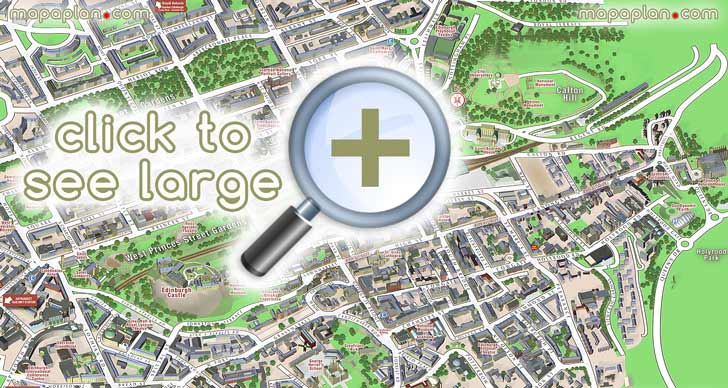
You can view, download or print a full, high resolution (detailed, large) version of this image by clicking on the plan itself
Edinburgh city centre 3 days itinerary planner - Travel layout guide free download - Offline map showing attractions & places to visit - Inner city plan showing places of interest along with street names & must-see destinations including Royal Mile - Edinburgh top tourist attractions map
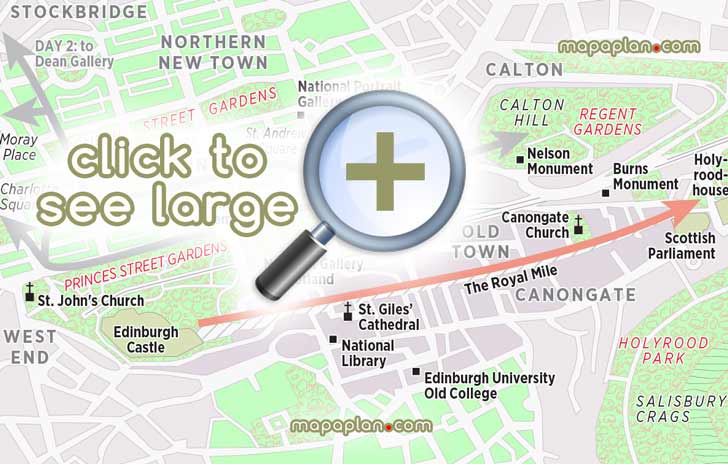
You can view, download or print a full, high resolution (detailed, large) version of this image by clicking on the plan itself
Edinburgh on the detailed map of Scotland, England and United Kingdom - Driving guide & urban navigation directions - Edinburgh top tourist attractions map
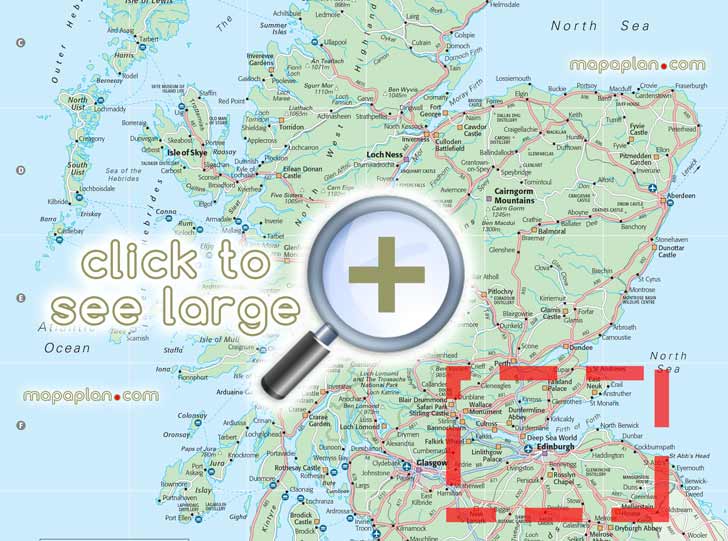
You can view, download or print a full, high resolution (detailed, large) version of this image by clicking on the plan itself
Top attractions in the Greater Edinburgh metro area in Scotland - Virtual map showing surrounding area & towns, best historical buildings - What to see, where to go, directions to fun things to do in the region - Edinburgh top tourist attractions map
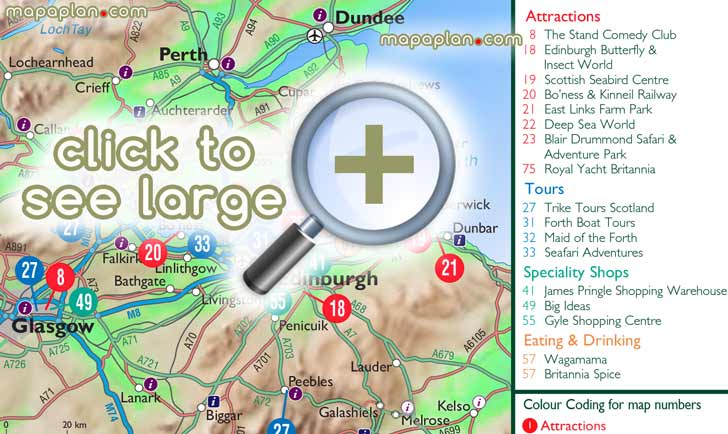
You can view, download or print a full, high resolution (detailed, large) version of this image by clicking on the plan itself
Greater Edinburgh tourist information guide map of attractions, rail network public transportation, railway stations, routes, stops, train lines network - Edinburgh top tourist attractions map
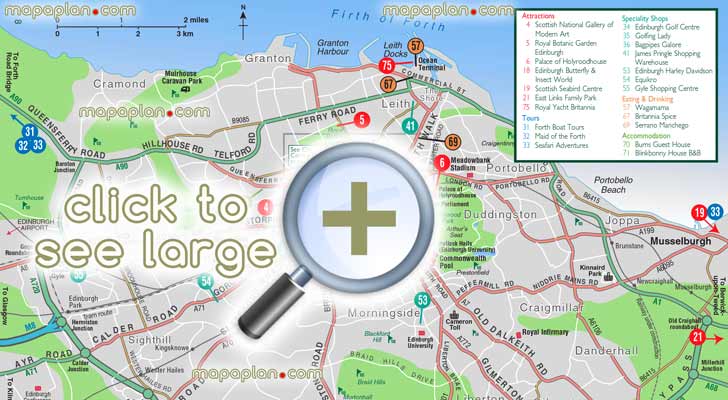
You can view, download or print a full, high resolution (detailed, large) version of this image by clicking on the plan itself
Edinburgh inner city center printable map with top attractions in Old & New Town district area neighbourhoods - List of points of interest - Public transport Waverley stations - Locations of the official tourist information centre - High quality road guide & street names large scale plan - Edinburgh top tourist attractions map
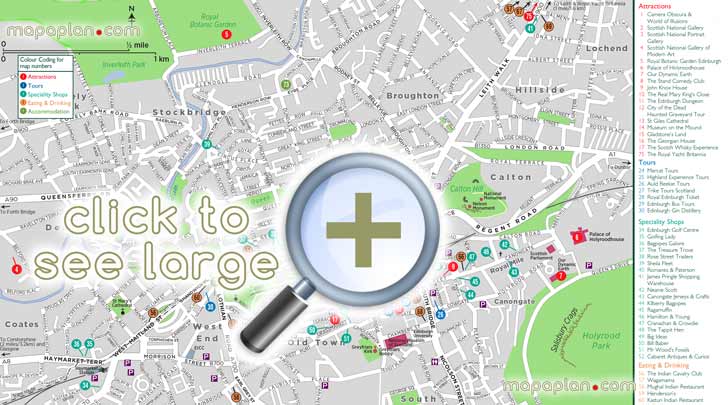
You can view, download or print a full, high resolution (detailed, large) version of this image by clicking on the plan itself
Simple & easy to navigate 3d aerial graphical satellite view map of Edinburgh inner city centre showing holiday top points of interest, central walkable sites, city-break historical places to visit including Royal Mile, Castle, Cathedral - Edinburgh top tourist attractions map
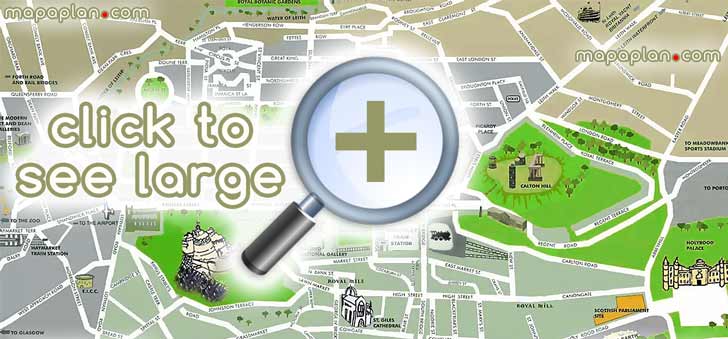
You can view, download or print a full, high resolution (detailed, large) version of this image by clicking on the plan itself
Hop-on hop-off bus map of Edinburgh City sightseeing tour - Double decker open top couch visitors' plan showing tour routes - Bird's eye graphical overview of the city trip highlights - Edinburgh top tourist attractions map
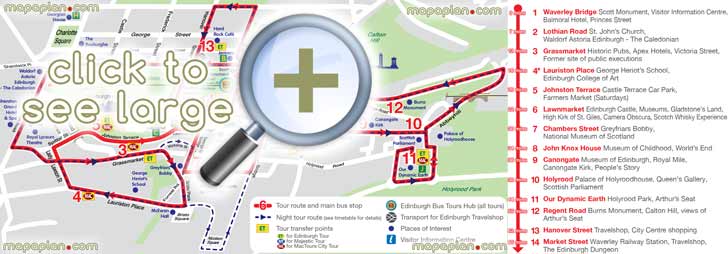
You can view, download or print a full, high resolution (detailed, large) version of this image by clicking on the plan itself
Central Edinburgh bus and tram map to download - Updated public transport diagram showing Lothian Buses, Airport Airlink - Edinburgh top tourist attractions map
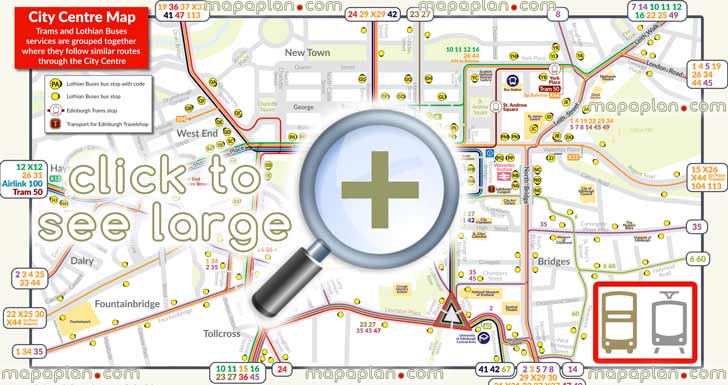
You can view, download or print a full, high resolution (detailed, large) version of this image by clicking on the plan itself
Royal Mile attractions list including downtown shopping destinations, restaurants, pubs, Waverley Train Station, Scottish Parliament, museums - Edinburgh top tourist attractions map
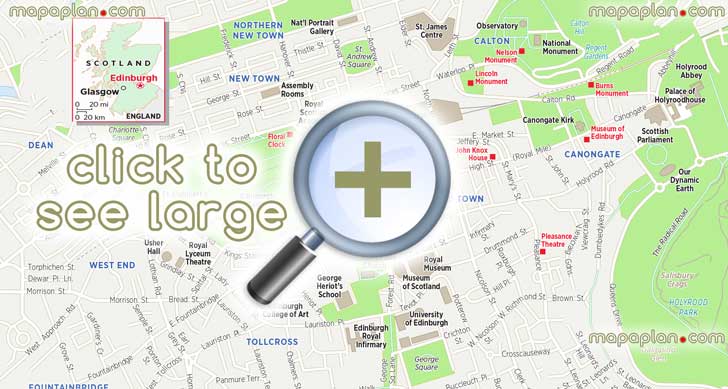
You can view, download or print a full, high resolution (detailed, large) version of this image by clicking on the plan itself
Princess Street guide map showing best destinations to visit in Edinburgh - Interactive walking map to print - Central district area outline layout map of best locations - Edinburgh top tourist attractions map
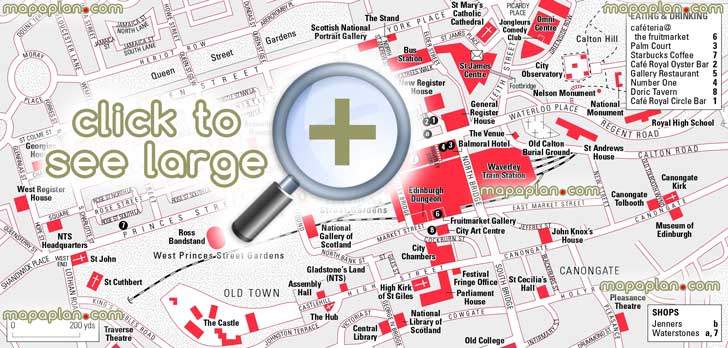
You can view, download or print a full, high resolution (detailed, large) version of this image by clicking on the plan itself
Old Town & Royal Mile Printable walking tour guide itinerary planner map with favourite attractions & points of interest to visit by tourists - City center great Scottish historic spots & best must-see sights - Edinburgh top tourist attractions map
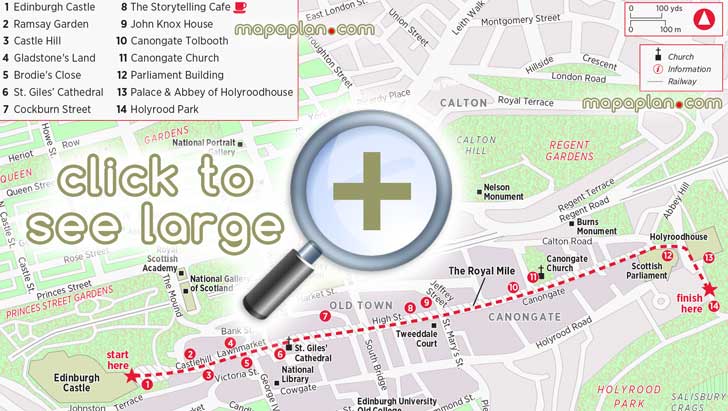
You can view, download or print a full, high resolution (detailed, large) version of this image by clicking on the plan itself
New Town walking tour guide itinerary planner showing layout of best things to do - 1-day trip travel map showing locations to visit, must-see tourist attractions, famous destinations, must-do spots & landmark destinations - Edinburgh top tourist attractions map
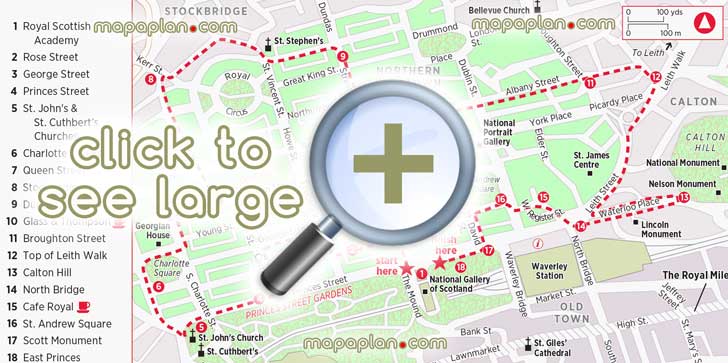
You can view, download or print a full, high resolution (detailed, large) version of this image by clicking on the plan itself
Holyrood and Arthur's Seat visitors map showing park Holyroodhouse Palace - Main tourist attractions walking tour printable pop-up map with key places to visit - Edinburgh top tourist attractions map
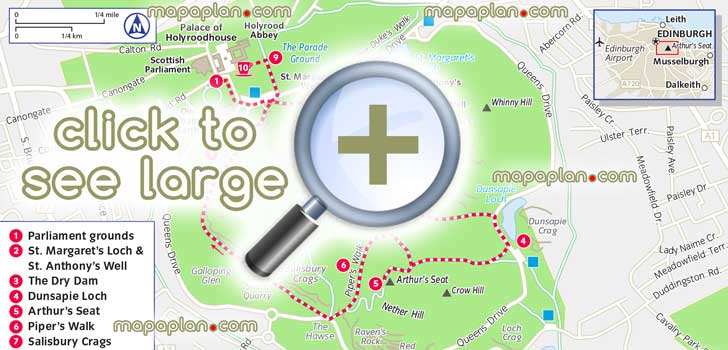
You can view, download or print a full, high resolution (detailed, large) version of this image by clicking on the plan itself
Water of Leith walkway map - Download the virtual explorer plan showing interesting sites & hot spots worth visiting - Edinburgh top tourist attractions map
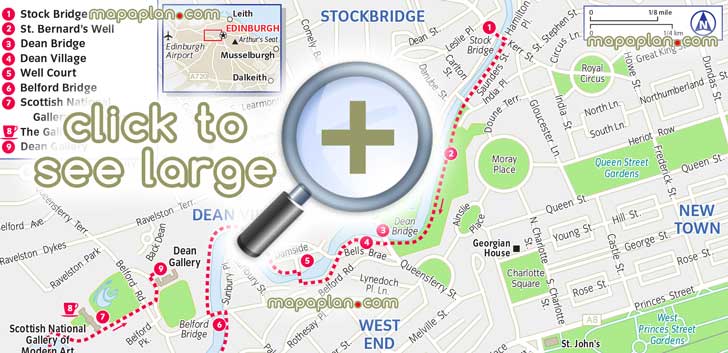
You can view, download or print a full, high resolution (detailed, large) version of this image by clicking on the plan itself
Leith walking tour guide itinerary planner with best sights to visit - Edinburgh top tourist attractions map
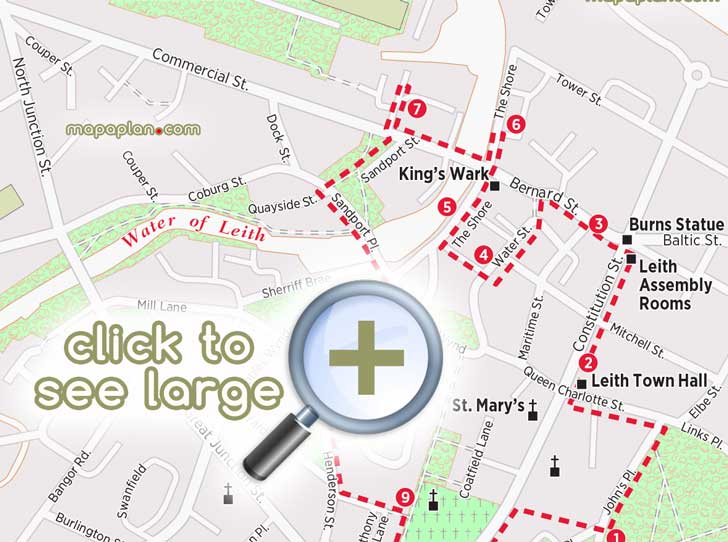
You can view, download or print a full, high resolution (detailed, large) version of this image by clicking on the plan itself
Central Edinburgh hotels and accommodation map with downtown city attractions - Best sights in a week detailed street plan - Edinburgh top tourist attractions map
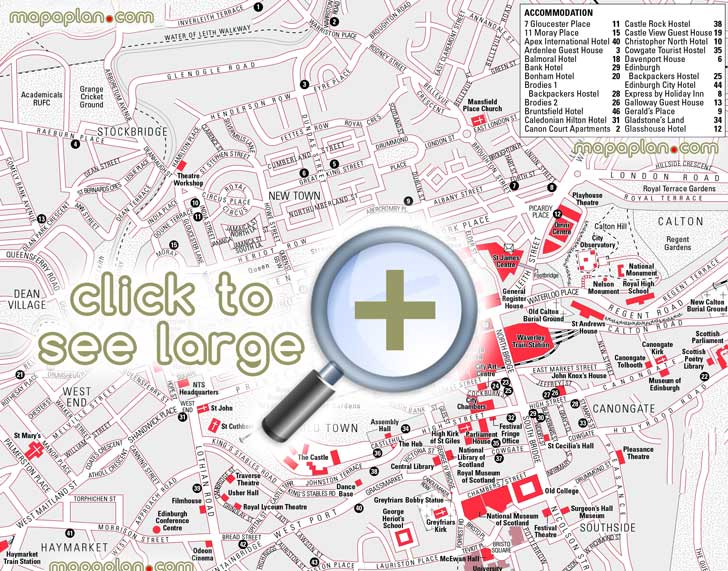
You can view, download or print a full, high resolution (detailed, large) version of this image by clicking on the plan itself
Best restaurants, cafes dining map of Edinburgh - Edinburgh top tourist attractions map
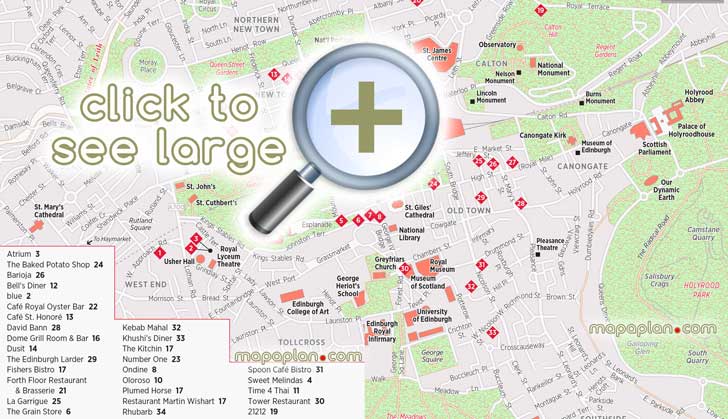
You can view, download or print a full, high resolution (detailed, large) version of this image by clicking on the plan itself
Shopping street map showing major department stores, list of most popular shops, favourite shopping destinations itinerary planner with navigation guide map - Edinburgh top tourist attractions map
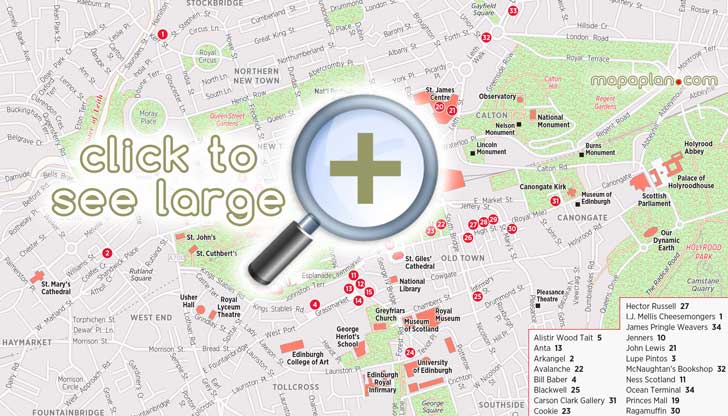
You can view, download or print a full, high resolution (detailed, large) version of this image by clicking on the plan itself
Nightlife & Entertainment map of Edinburgh Royal Mile, New & Town with night clubs, pubs, bars, theatres, cinemas - Edinburgh top tourist attractions map
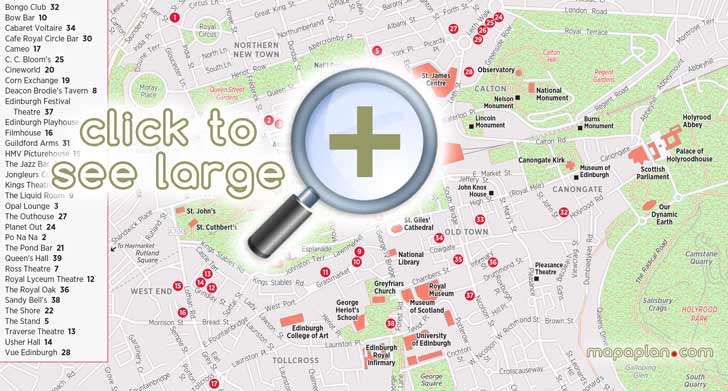
You can view, download or print a full, high resolution (detailed, large) version of this image by clicking on the plan itself
Edinburgh Festival all venues map showing fun & easy to access places within walking distance - Edinburgh top tourist attractions map
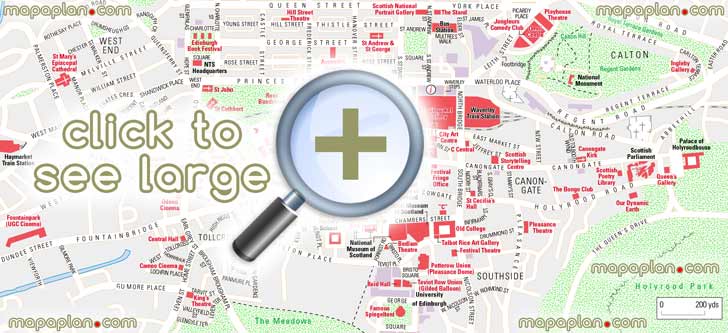
You can view, download or print a full, high resolution (detailed, large) version of this image by clicking on the plan itself
Free to download street & road names detailed hd map - Edinburgh top tourist attractions map
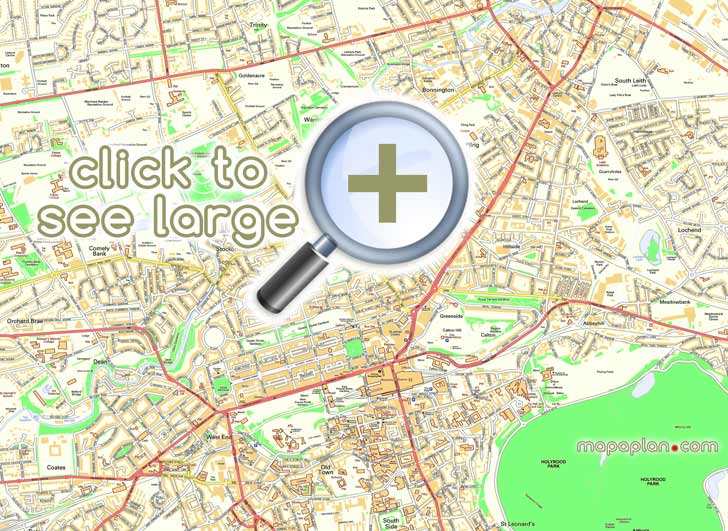
You can view, download or print a full, high resolution (detailed, large) version of this image by clicking on the plan itself
Beautifully illustrated map for children showing fun & easy to access places within walking distance - Edinburgh top tourist attractions map
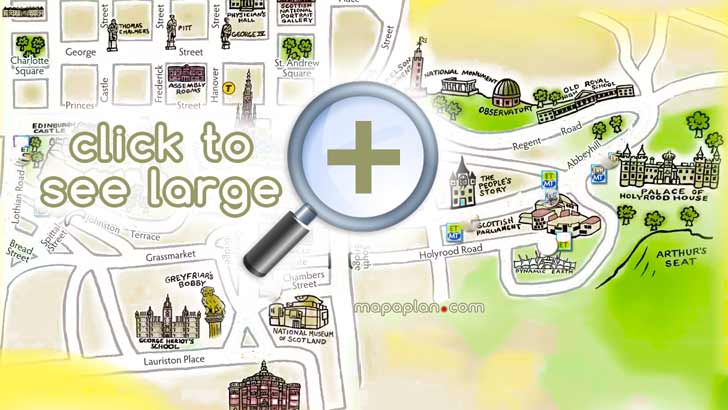
You can view, download or print a full, high resolution (detailed, large) version of this image by clicking on the plan itself
Central Edinburgh main neighbourhoods free download plan on the map of Scotland - Great family things to do and explore with kids - Fun & interesting ideas where to go around central Edinburgh area - Edinburgh top tourist attractions map
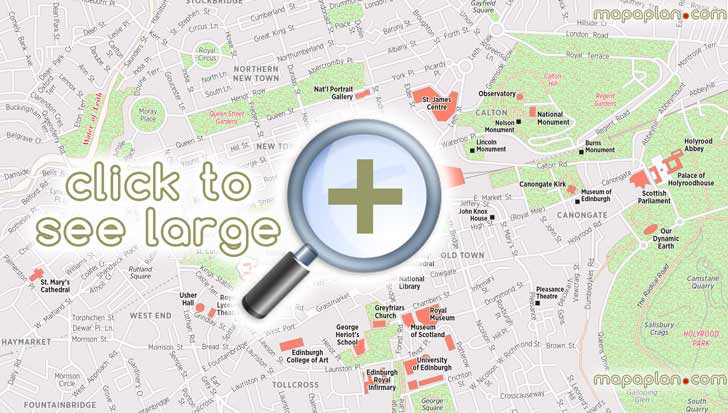
You can view, download or print a full, high resolution (detailed, large) version of this image by clicking on the plan itself
Greater Edinburgh top attractions & highlights detailed map showing famous sites to explore including Royal Yacht Britannia, Holyrood Park, Arthur's Seat - Edinburgh top tourist attractions map
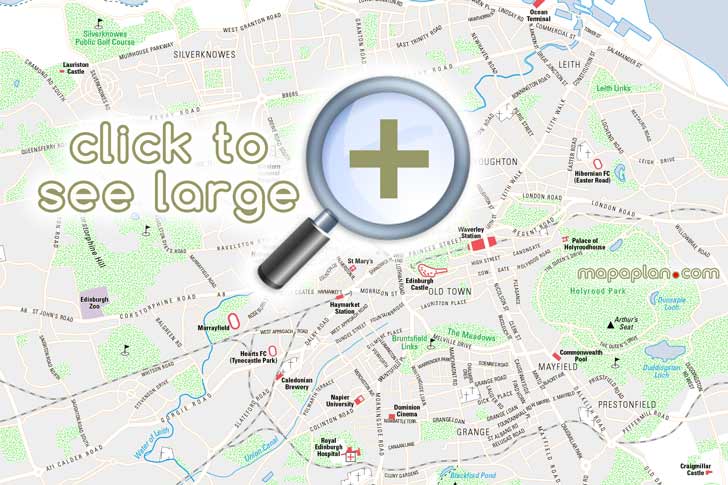
You can view, download or print a full, high resolution (detailed, large) version of this image by clicking on the plan itself
New map showing travel sites, landmarks, top sights in Central Edinburgh including Edinburgh Castle, National Gallery, Royal Museum, Calton Hill, Old Town - Greater metro area with Airport, Waverley train railway station and coach bus station, official tourist information centre - Edinburgh top tourist attractions map
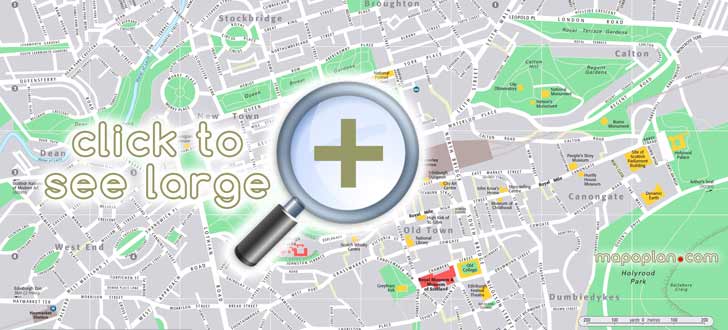
You can view, download or print a full, high resolution (detailed, large) version of this image by clicking on the plan itself
Best of Edinburgh in 1, 2 & 3 days - Interactive walking map to print - Central district area outline layout map of best locations to visit - Edinburgh top tourist attractions map
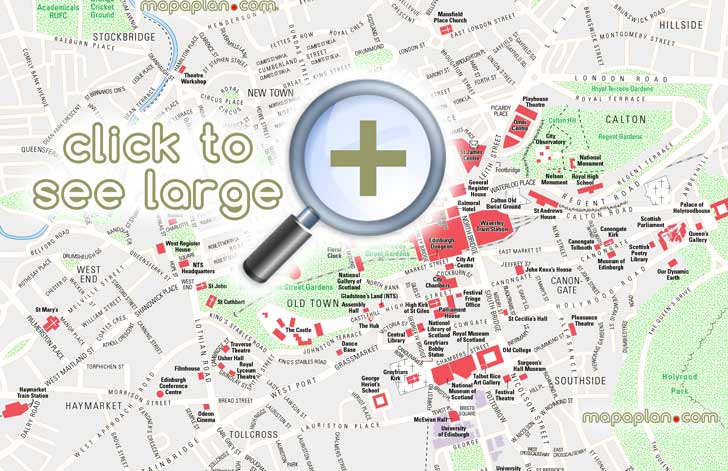
You can view, download or print a full, high resolution (detailed, large) version of this image by clicking on the plan itself
New Town map with must-see sights, the most iconic locations - Printable detailed travel visitors' orientation & navigation walking guide - Edinburgh top tourist attractions map
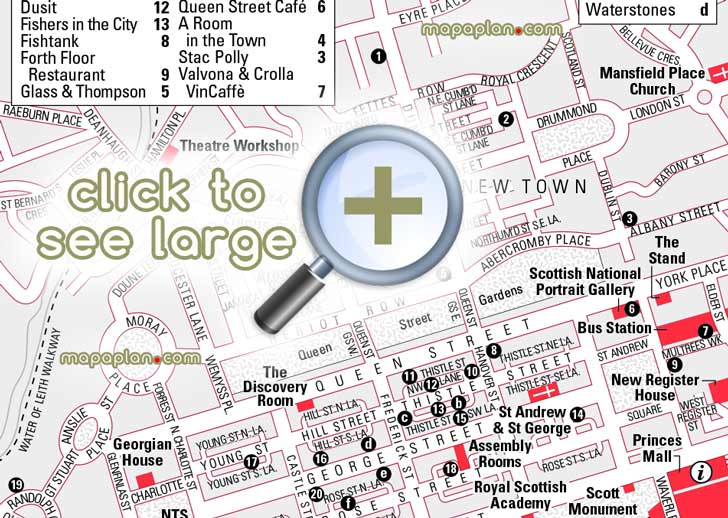
You can view, download or print a full, high resolution (detailed, large) version of this image by clicking on the plan itself
Calton Hill dining and shopping tourist guide map showing best sites including Nelson Monument, churches, Regent Gardens - Edinburgh top tourist attractions map
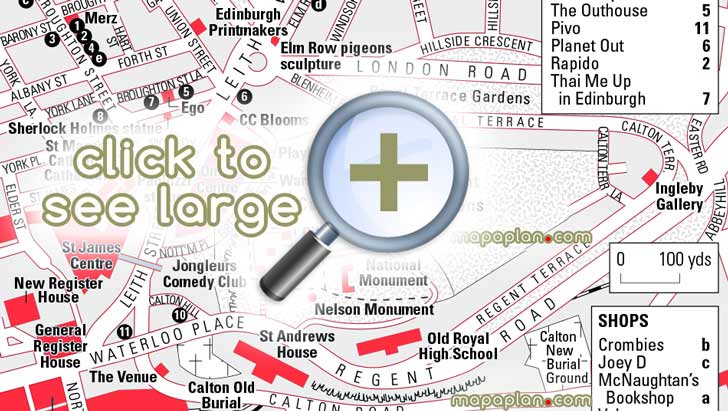
You can view, download or print a full, high resolution (detailed, large) version of this image by clicking on the plan itself
Water of Leith river map showing Scottish National Modern Art Gallery, Royal Botanic Gardens - Edinburgh top tourist attractions map
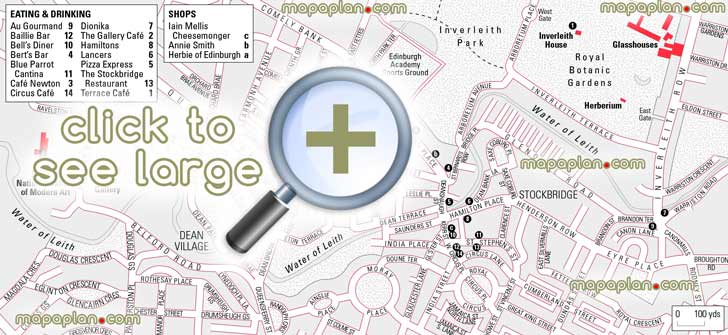
You can view, download or print a full, high resolution (detailed, large) version of this image by clicking on the plan itself
Arthur's Seat & Holyrood Park visitors map showing Holyroodhouse Palace - Edinburgh top tourist attractions map
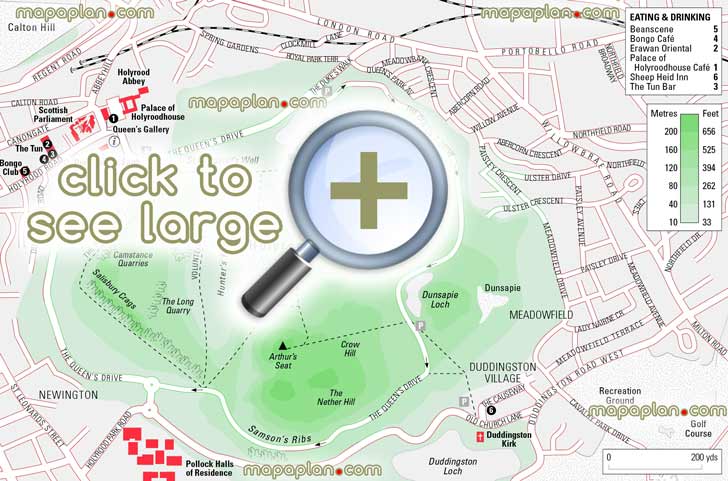
You can view, download or print a full, high resolution (detailed, large) version of this image by clicking on the plan itself
Leith travel guide showing best eateries and popular places including Royal Yacht Britannia, Links, Docks - Edinburgh top tourist attractions map
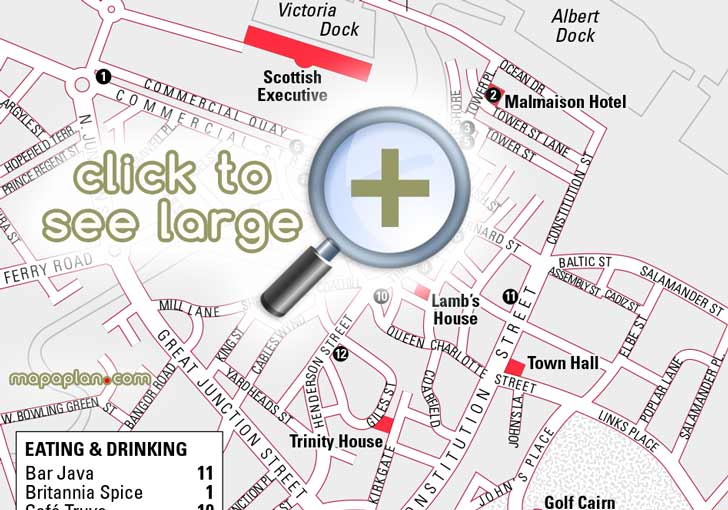
You can view, download or print a full, high resolution (detailed, large) version of this image by clicking on the plan itself
Central Edinburgh attractions jpg map including Meadows, Calton Hill, Georgian House, Museum of Scotland, National Gallery - Edinburgh top tourist attractions map
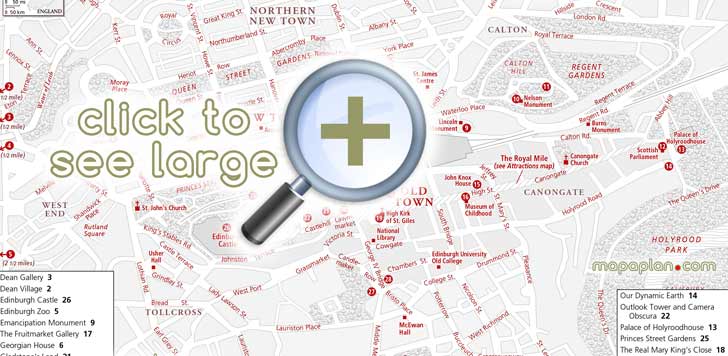
You can view, download or print a full, high resolution (detailed, large) version of this image by clicking on the plan itself
Map of top 10 attractions in Edinburgh
The typical top ten attractions are listed below. You can find the detailed locations of these places on the maps above.
- Arthur's Seat and Holyrood Park - It's rare to find a hike of such natural beauty in any city. But Edinburgh is no ordinary metropolis. You can walk to the top of Arthur's Seat or cheat and drive to the park — either way, you find great views.
- Edinburgh Castle - This mighty historic fortress, perched atop its impregnable rock, is compelling from all angles as well as from within.
- Calton Hill - Studded with a bizarre collection of Neoclassical architecture, this is the best of many great viewpoints from which to gaze out over the city.
- The Royal Mile - One of the world's most famous streets, with every cobbled inch resonant with history and atmosphere. The Royal Mile is, in fact, one mile 110 yards in length, measuring from the castle drawbridge to the gates of Holyroodhouse. It has different names at various points along its length: the short, narrow section from the castle to the roundabout outside The Hub is called Castle Hill. At this point it becomes the Lawnmarket; while east of the main junction with the Mound and George IV Bridge it is the High Street. The fi nal section, after the junction with St Mary's Street, is the Canongate. With its historic old buildings, closely packed tenements and shadowy closes, the Royal Mile ranks as one of the great streets of the world. Running downhill along a ridge from the cliff-skirted castle above the city to the Palace of Holyroodhouse, the Royal Mile remains medieval in character (if not always in reality), and is still the most resonant part of the Old Town, with a palpable sense that over the centuries most of Scottish history has passed this way. Even today it's at the heart of Scottish affairs, with politicians, judges and journalists mixing with the throngs of tourists ambling between the sights and souvenir shops.
- Royal Yacht Britannia - Moored alongside Terence Conran's huge Ocean Terminal shopping and entertainment centre, Britannia is one of the world's most famous ships. Launched in 1953, she was used by the royal family over 44 years for state visits, diplomatic functions, honeymoons and holidays.
- National Museum of Scotland - This impressive piece of contemporary design is a worthy home for Scotland's national historic treasures.
- Palace of Holyroodhouse - An impressive introduction into the lives and loves of the Scottish kings and queens. Compared to most royal palaces, visitor access to Holyroodhouse is extensive.
- Forth Rail Bridge - The gigantic girders of this iconic monument to Victorian engineering span the Firth of Forth just north of Edinburgh.
- Scottish Parliament - Overflowing with imagery, quirky design and controversy, and now one of the city's star attractions.
- Princess Street and Old Town - Princes Street is very much the centre of Edinburgh, with trains pulling into Waverley Station, buses and taxis arriving from all points and the pavements thick with tourists and shoppers. The latter are found in their droves along the north side of the street, where chain stores and a hotch-potch of architectural styles create an unlovely prospect. This is immediately redeemed to the south via a swathe of gardens as well as monuments, grand galleries and an unforgettable vista of the castle and Old Town.
- New Town - From its outset, the New Town was planned as a total contrast to the Old Town: the layout was to be symmetrical, the streets broad and straight, and the architecture unashamedly grand and spacious. Though originally intended as a residential area, the central part of the New Town is now the bustling hub of the city's professional and business life, dominated by shops, banks and offices. Its unique historic character, however, is obvious at every turn, especially if you head for the dignified Georgian streets to the north, which remain one of the best-planned, elegant quarters of any European city.
- Leith - Leith is Edinburgh's historic port where the Water of Leith meets the Firth of Forth. Although Leith is generally known as the port of Edinburgh, it developed independently of the city up the hill. While the stand-alone attractions are few, Leith is an intriguing place to explore, worth visiting not just for the contrasts to central Edinburgh, but also for its nautical air and the excellent eating and drinking scene, which majors on seafood but also includes haute cuisine and well-worn, friendly pubs.
- Other popular attractions include: Bruntsfield Links, City Observatory, Edinburgh Zoo, The Fruitmarket Gallery, The Meadows, Museum of Childhood, Museum of Edinburgh, National Gallery of Scotland, National Monument, National Museum of Scotland, Nelson Monument, Princes Street Gardens, Royal Scottish Academy, Royal Botanic Garden, St. Giles' Cathedral, Scotch Whisky Heritage Centre, Scott Monument, Scottish National Portrait Gallery, Scottish Parliament Building, Writers' Museum, Holyrood Park, Camera Obscura and World of Illusions, Real Mary King's Close, The Edinburgh Dungeon.
What are some interesting facts about Edinburgh?
Getting around - Walking is the best way to explore Edinburgh, particularly the Old Town's closes and wynds. If you'd rather not walk there are taxi ranks all along the Royal Mile. Private vehicles are restricted on the upper section of the Royal Mile; there are parking areas on Castle Terrace and New Street. If driving, pay particular attention to parking regulations – the city's black jacketed traffic wardens come with a fearsome reputation!
Orientation - It's fairly easy to find your bearings around Edinburgh. The city is centered on its oldest street, the Royal Mile, which runs downhill from Edinburgh Castle in the west to the Palace of Holyroodhouse in the east. The Royal Mile is actually just over a mile and changes name several times during its course (Castlehill, Lawnmarket, High Street and Canongate). To the north of the Royal Mile is Princes Street, Edinburgh's principal shopping street, which also marks the demarcation between the Old and New Towns. North of Princes Street is the Georgian New Town with its elegant houses and streets. South of Princes Street is the Old Town, the original medieval city, with its narrow closes and wynds (pronounced as in 'wind your watch,' these are alleys or narrow streets) spilling down from the Royal Mile.
City layout - Central Edinburgh is divided into the Old Town, where the city began, and the larger New Town, where it expanded in the 1700s. Many visitors find lodgings in New Town and tend to visit Old Town for sightseeing, dining, and drinking. There are hotels, however, in the historic core of the city on High Street and in the Grassmarket.
Old Town - This is the core of historic Edinburgh, with the centrepiece Royal Mile and its string of key attractions running east from the castle down to Holyrood, home of the royal palace and brand-new parliament. The tangled passageways and courtyards which lead off the Mile are far less touristy, and remain evocative of the area's medieval character. Royal Mile stretches for about 1.6km (1 mile) from Edinburgh Castle downhill to the Palace of Holyroodhouse. The Royal Mile is one boulevard with four segments bearing different names: Castlehill, Lawnmarket, High Street, and Canongate.An infamous street at the southern base of the castle is the Grassmarket, both a street and a district, where convicted criminals were once hanged on the gallows. Today it's home to restaurants, pubs, and hotels.
New Town - A masterpiece of early town planning, with row upon elegant row of impressive Georgian houses intermixed with haughty Neoclassical monuments, the New Town's oldest quarter has been colonized by department stores and offices. Explore further and you'll discover attractive residential enclaves as well as bohemian Broughton, the focus of Edinburgh's gay scene. New Town is the city's main shopping precinct today, with broad sidewalks and smart shops, bars, and restaurants. Its busiest boulevard, Princes Street, offers panoramic views of Old Town and Edinburgh Castle. Parallel to Princes Street is New Town's second great boulevard, George Street, which begins at St. Andrew Square and runs west to Charlotte Square.
Leith - The port of Edinburgh, Leith is just as historic as the city – if rather less well preserved and fringed by some grim housing estates. The old harbour, however, now holds some fine seafood restaurants, while the redeveloped former docklands are the retirement home of that epitome of the British establishment, the Royal Yacht Britannia.
Stockbridge - Today part of the New Town area, Stockbridge is a one-time village that still feels rather like a small town because of its tightly-knit community.
Holyrood Park - Just half a mile from the city centre, this vast public park covers as large an area as the Old and New Towns combined. Mostly made up of rough, hilly terrain that offers some terrific walks, it incorporates the 823-foot peak of Arthur's Seat as well as the striking Salisbury Crags cliffs.
Calton - Encompassing Calton Hill with its Regent and Royal terraces (streets), this district borders the so-called Pink Triangle, Edinburgh's version of a gay-friendly district.
Water of Leith - Edinburgh's fairly placid Water of Leith is little more than a stream, but as it meanders through the city's northern suburbs, its course links various important sights, including the city's most dynamic art galleries, the tranquil Botanic Garden and the suburban villages of Dean and Stockbridge. Within walking distance of the city centre, and with a pleasant walkway running along the banks of the river, this stretch of the city makes a delightfully verdant escape from uptown's bustle and traffic, with both indoor and outdoor attractions, a good mixture of culture and nature, and plenty of attractive cafés, bars and restaurants.
Shopping - Jenners is the grande dame of Edinburgh shops, this old-fashioned department store has overseen the comings and goings of Princes Street for more than a century. The city's quaintest shopping street is the Victoria Street. With a string of unusual one-off shops that include a portmanteau maker and a cheesemonger. St Stephen Street is an intriguing Stockbridge side street that has a low-key collection of pubs, places to eat, secondhand clothes boutiques and craft shops.
How can I find specific tourist attractions on the map of Edinburgh?
Our interactive city maps are easy to explore. You can pan, zoom in, and zoom out on the high-resolution map to locate major tourist attractions. Each map highlights key landmarks, making it simple to find the sights you're most interested in, whether it's a famous monument, museum, or other point of interest.
Can I get a visual representation of the area around Edinburgh?
For some cities, we provide a general view of the area surrounding popular attractions. While this image won't show the exact street-level view, it helps you understand the layout of the neighborhood, showing how the landmarks are situated in relation to other points of interest around Edinburgh.
Can I explore maps for both tourist attractions and other points of interest?
Yes! Our platform offers maps covering a range of highlights, from top tourist attractions to other noteworthy areas such as parks, restaurants, and entertainment venues. Whether you're planning a visit to a museum or looking for a nearby park, our detailed maps make it easy to find the best spots in the city.
Related keywords
2023, 2024, 2025, 2025, 2026, 2027, 2028, 2029, map, plan, download, print, printable, free, detailed, aerial, bird's eye, satellite, guide, planner, travel, sightseeing, visit, trip, tour, tourist, what to do, where to go, things to do, must see, top attractions, points of interest, places, sites, sights, buildings, spots, destinations, locations, landmark, museum, in a week, in 3 days, one day, city, route, bus, kids, children, top 10, top ten, popular, famous, interesting, highlights, public transport, rail, hotels, updated, metro, subway, underground, tube, downtown, coach, nightlife, pub, monument, satellite, accommodation, transit, transportation, supermarket, children, metro, subway, underground, tube